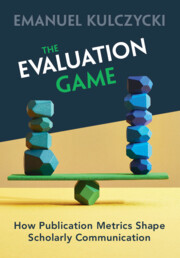Book contents
- The Evaluation Game
- The Evaluation Game
- Copyright page
- Contents
- Acknowledgments
- Introduction
- 1 Evaluation as Power
- 2 Economization and Metricization
- 3 Untold Histories of Research Evaluation
- 4 The Diversity of Evaluative Powers
- 5 Players and the Stakes
- 6 Playing the Evaluation Game
- Conclusions
- References
- Index
Conclusions
Published online by Cambridge University Press: 21 April 2023
- The Evaluation Game
- The Evaluation Game
- Copyright page
- Contents
- Acknowledgments
- Introduction
- 1 Evaluation as Power
- 2 Economization and Metricization
- 3 Untold Histories of Research Evaluation
- 4 The Diversity of Evaluative Powers
- 5 Players and the Stakes
- 6 Playing the Evaluation Game
- Conclusions
- References
- Index
Summary
In the concluding chapter, the author investigates whether it is possible to move beyond the inevitability of metrics, and what doing so might imply. The author shows that the greatest challenge lies in individualized thinking about science and the focus on the accumulation of economically conceived value by institutions. This is because the problem does not lie in metrics. Rather, the problem is an underlying logic of economization, and it is only by uprooting it that one could change today’s academia. Still, any new logic would also be legitimized by new metrics. Therefore, this book’s conclusion is neither a proposal for a ‘responsible use of metrics,’ nor a call to abandon the use of all metrics in academia. A third way is needed. Thus the book’s key contribution is its call for a rejection of these two potential responses and its insistence on the necessity that we set out now on a course that can offer hope of charting such a third response. In this spirit, the author sketch out seven principles that should be kept in mind when rebuilding not only a new system of scholarly communication but, more importantly, an academia that is not driven by metrics.
Keywords
Information
- Type
- Chapter
- Information
- The Evaluation GameHow Publication Metrics Shape Scholarly Communication, pp. 182 - 196Publisher: Cambridge University PressPrint publication year: 2023
